
South Korea, officially the Republic of Korea (ROK), is a country in East Asia. It constitutes the southern part of the Korean Peninsula and borders North Korea along the Korean Demilitarized Zone. The country's western border is formed by the Yellow Sea, while its eastern border is defined by the Sea of Japan. South Korea claims to be the sole legitimate government of the entire peninsula and adjacent islands. It has a population of 51.96 million, of which roughly half live in the Seoul Capital Area, the fourth most populous metropolitan area in the world. Other major cities include Incheon, Busan, and Daegu.
The following is an overview of events in 1984 in film, including the highest-grossing films, award ceremonies and festivals, a list of films released and notable deaths.

The national flag of the Republic of Korea, also known as the Taegeukgi, has three parts: a white rectangular background, a red and blue Taegeuk in its center, accompanied by four black trigrams, one in each corner. Flags similar to the current Taegeukgi were used as the national flag of Korea by the Joseon dynasty, the Korean Empire, as well as the Korean government-in-exile during Japanese rule. South Korea adopted the Taegeukgi as its national flag when it gained independence from Japan on 15 August 1945.

Kim Yun-jin, known professionally in the West as Yunjin Kim, is a American-Korean actress. She is best known for her role as North Korean spy Bang-Hee in the South Korean film Shiri (1999), the daughter of a powerful Korean businessman on the American television series Lost (2004–2010), as well as series such as Mistresses (2013–2016), Money Heist: Korea - Joint Economic Area (2022), XO, Kitty (2023–present).
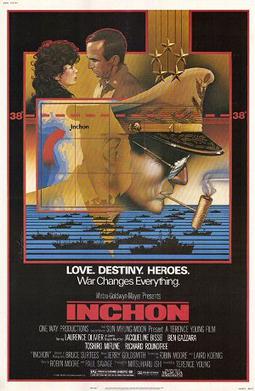
Inchon is a 1981 war film about the Battle of Inchon, considered to be the turning point of the Korean War. Directed by Terence Young and financed by Unification movement founder Sun Myung Moon, the film stars Laurence Olivier as General Douglas MacArthur, who led the United States' surprise amphibious landing at Incheon, South Korea in 1950, with Jacqueline Bisset, Ben Gazzara, Toshiro Mifune and Richard Roundtree.

Shin Sang-ok was a South Korean filmmaker with more than 100 producer and 70 director credits to his name. His best-known films were made in the 1950s and 60s, many of them collaborations with his wife Choi Eun-hee, when he was known as "The Prince of South Korean Cinema". He received posthumously the Gold Crown Cultural Medal, the country's top honor for an artist.
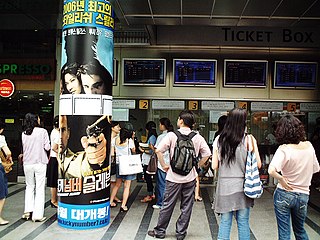
South Korean films have been heavily influenced by such events and forces as the Korea under Japanese rule, the Korean War, government censorship, the business sector, globalization, and the democratization of South Korea.

Jung is a Latin alphabet rendition of the Korean family name "정", also often spelled Jeong, Chung, Joung or Jong. As of the South Korean census of 2015, there were 2,407,601 people by this name in South Korea or 4.84% of the population. The Korean family name "정" is mainly derived from three homophonous hanja. 鄭 (2,151,879), 丁 (243,803) and 程 (11,683). The rest of the homophonous hanjas include: 政 (139), 桯 (41), 定 (29), 正 (22) and 情 (5).
This is a list of films by year produced in the country of South Korea which came into existence officially in September 1948. The lists of Korean films are divided by period for political reasons. For earlier films of united Korea see List of Korean films of 1919–1948. For the films of North Korea see List of North Korean films. For an A-Z list of films see Category:Korean films.

The South Korea women's national handball team is the national team of South Korea. Since 1984 the Korean team has not only participated constantly in Olympic Games but also ranked among the top four nations every time until 2012. Korea grabbed the gold medal in 1988 and 1992, won the silver medal in 1984, 1996, 2004 and took bronze medal in 2008. They have earned two World Championship medals so far: In 1995, they also won the World Championship title in Austria/Hungary 1995 World Women's Handball Championship, they came off third to secure the bronze medal at the Croatia in 2003 World Women's Handball Championship. It is a twelve time Asian Champion, the tournament has been won by any other nation only twice.
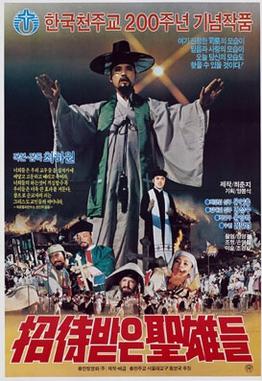
Invited People is a 1981 South Korean film directed by Choi Ha-won. It was chosen as Best Film at the Grand Bell Awards.
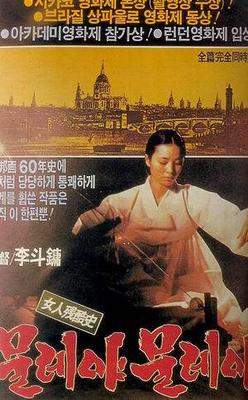
Mulleya Mulleya, is a 1984 South Korean film directed by Lee Doo-yong. It was chosen as Best Film at the Grand Bell Awards. It was screened in the Un Certain Regard section of the 1984 Cannes Film Festival. The film was also selected as the South Korean entry for the Best Foreign Language Film at the 57th Academy Awards, but was not accepted as a nominee.
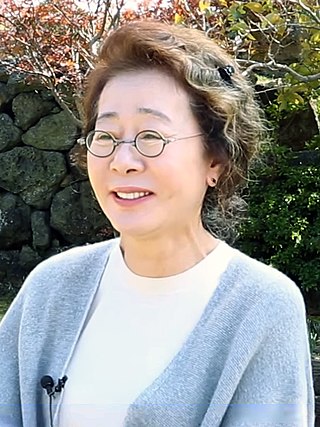
Youn Yuh-jung is a South Korean actress, whose career in film and television spans over five decades. Her accolades include an Academy Award, a Screen Actors Guild Award, a British Academy Film Award, two Independent Spirit Awards, and a nomination for a Critics' Choice Movie Award. She has starred in many South Korean television series and films.
The Korean Cultural Center New York is a branch of the South Korean Korean Cultural Centers located in New York City, New York, United States.
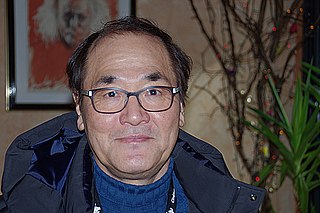
Bae Chang-ho is a South Korean director and screenwriter.
The Korean Film Council (KOFIC) is a state-supported, self-administered organization under the Ministry of Culture, Sports and Tourism (MCST) of the Republic of Korea.
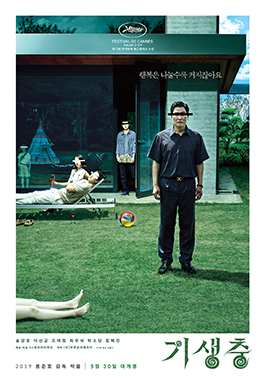
Parasite is a 2019 South Korean black comedy thriller film directed by Bong Joon-ho, who co-wrote the screenplay with Han Jin-won and co-produced. The film, starring Song Kang-ho, Lee Sun-kyun, Cho Yeo-jeong, Choi Woo-shik, Park So-dam, Jang Hye-jin, Park Myung-hoon, and Lee Jung-eun, follows a poor family who infiltrate the life of a wealthy family.














